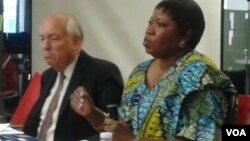African leaders, including President Robert Mugabe, have accused the International Criminal Court (ICC) of witch-hunting Africans, given that all its cases are from the continent.
Now that an African woman is the ICC’s chief prosecutor, will anything change?
Fatou Bensouda, the ICC’s chief prosecutor since June 2012, hails from Gambia, West Africa.
“Of course, as an African, I am a very proud on … because I think in all these cases that are coming from Africa, to the ICC, and I having the privilege to work for those victims, I feel honored that I’m in this position.”
Bensouda took over from Luis Moreno-Ocampo of Argentina, who faced a backlash from African leaders who accused him of leading a witch-hunt against Africans, given that all eight cases before the court are from Africa.
But Bensouda, who was Ocampo’s deputy, disputes that, and clarifies that African leaders, including Ugandan president Yoweri Museveni, one of Ocampo’s harshest critics, approached the ICC for help.
In Uganda’s case, it was for the capture of Joseph Kony and his Lord’s Resistance Army conspirators, who are all still at large.
“We are in African countries because African governments are requesting the ICC to investigate and prosecute. We have eight situations, and of those eight, five were at the request of African governments – Uganda, Democratic Republic of Congo, Central African Republic, Cote D’Ivoire, Mali.”
Those not requested directly by countries, explains Bensouda, are Sudan and Libya, both non-members countries, and Kenya. Backlash on these indictments stemmed from the fact that heads of state were directly charged, namely – Sudan’s Omar Al Bashir for atrocities in Darfur, in western Sudan, and Libya’s Moummar Ghadaffi for war crimes, though it was removed after his death. Both Sudan and Libya, explains Bensouda, were referrals by the United Nations.
“The three, where we do not have referral or request for intervention, two of them were referrals from the United Nations Security Council, acting under Chapter 7 of the UN Security Charter. The UN could have requested courts, if they wanted, like they did for Rwanda, or what they did for Yugoslavia, but under the ICC statute, the UN can also ask the ICC to intervene and prosecute.”
Bensouda says even though Libya and Sudan were referred by the UN, African member states in the Security Council, voted to approve the ICC’s involvement.
When resolution 1593 for Sudan was being debated, in the council, there were African states, who were presented at the council and who voted for the case to be taken to the ICC. At that time I think it was only Algeria, if I recall, that abstained from voting. But all other African states, both in the Libya resolution, and in the Sudan resolution, including countries like South Africa, Nigeria, were sitting in the council and voted for the intervention. Of the ICC. So that‘s another way where we can have jurisdiction, where, that particular state is not a state party to the ICC.
The third and most controversial of ICC’s indictments, pertains to the indictment of Kenya’s president Uhuru Kenyatta and his deputy, William Ruto for their alleged roles in Kenya’s 2007-2008 election violence, before being voted in to office.
Tune in Tuesday for Bensouda’s account of how and why, the ICC intervened.





